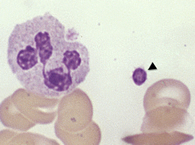News Release: Research, School of Medicine
Aug. 11, 2009
Potential Risk Identified in Transfusions of Platelets Before Bone Marrow Transplant
 Platelets (arrow) are very small compared to other blood cells and contain no DNA, but may still stimulate immunity and transplant rejection. Source: CDC public health image library.
Platelets (arrow) are very small compared to other blood cells and contain no DNA, but may still stimulate immunity and transplant rejection. Source: CDC public health image library.Research on blood transfusions points to a potential risk of transfusing donated platelets, especially to patients with bone marrow failure syndromes who are subsequently candidates for bone marrow transplantation.
The results are online and scheduled for publication in the September 1 issue of the Journal of Clinical Investigation.
Doctors have noticed a pattern in performing bone marrow transplants as a cure for diseases involving bone marrow failure: more transfusions before a bone marrow transplant correlates with a higher likelihood of rejection, says James Zimring, MD, PhD, assistant professor of pathology and laboratory medicine at Emory University School of Medicine.
However, the cause-and-effect relationship between transfusion and bone marrow transplant rejection is unclear. More transfusions may just be needed to treat more severe disease, and more severe underlying disease may cause increased rates of bone marrow transplant rejection, Zimring says.
"Platelets are mostly given to prevent or to stop acute bleeding or hemorrhage. Clearly, none of us would risk a patient bleeding to avoid possible complications for a subsequent bone marrow transplant. Greater understanding of the biology involved is required to modify our transfusion and/or transplantation procedures so as to circumvent the problem," he says.
Bone marrow failure syndromes can be inherited or acquired as result of infection or exposure to radiation, insecticides or industrial solvents. Bone marrow failure means the bone marrow can't produce new blood cells, leading to anemia, trouble fighting infections and difficulty controlling bleeding.
To probe for the causes of bone marrow transplant rejection after transfusions, Zimring, graduate student Seema Patel and co-workers established a model system in mice. The system was designed to simulate transplants for bone marrow failure syndromes and do not apply to transplants carried out to treat cancer, which destroy more of the immune system beforehand.
They found that platelet transfusions given to mice before a bone marrow transplant drastically increased the likelihood that the transplant will be rejected.
Donor and recipient were "matched" for their MHC (major histocompatibility complex) genes, the most important determinants of transplant compatibility.
Platelets are already processed to remove white blood cells, with the aim of reducing the risk of immune-related problems. In addition, blood banks already test for antibodies against proteins encoded by MHC genes. In humans, MHC genes are known as HLA (human leukocyte antigen).
Zimring says the remaining concern about immune incompatibility comes from other proteins on the platelets themselves, termed "minor antigens." Immune responses to minor antigens are not currently monitored in patients, so the extent to which they occur is unknown.
Ultimately, modification of the transfused platelets or matching for minor antigens on donated platelets may remedy the problem, he says. A careful human clinical study would be required to establish if the same mechanisms occur in humans.
A related paper by Zimring and his colleagues describing the effects of pre-transplant transfusions of red blood cells in mice was recently published in the journal Blood.
The research was supported by the National Institutes of Health.
References:
S.R. Patel, C.M. Cadwell, A. Medford and J.C. Zimring. "Bone Marrow Transplant Rejection Induced by Platelet Transfusion." J. Clin. Invest. 119: (Sept 2009).
M. Desmarets, C.M. Cadwell, K.R. Peterson, R. Neades, and J.C. Zimring. "Minor histocompatibility antigens on transfused leukoreduced units of red blood cells induce bone marrow transplant rejection in a mouse model." Blood (epub before print).
###
The Robert W. Woodruff Health Sciences Center of Emory University is an academic health science and service center focused on missions of teaching, research, health care and public service. Its components include schools of medicine, nursing, and public health; Yerkes National Primate Research Center; the Emory Winship Cancer Institute; and Emory Healthcare, the largest, most comprehensive health system in Georgia. The Woodruff Health Sciences Center has a $2.3 billion budget, 17,000 employees, 2,300 full-time and 1,900 affiliated faculty, 4,300 students and trainees, and a $4.9 billion economic impact on metro Atlanta.
Learn more about Emory’s health sciences:
Blog: http://emoryhealthblog.com
Twitter: @emoryhealthsci
Web: http://emoryhealthsciences.org
